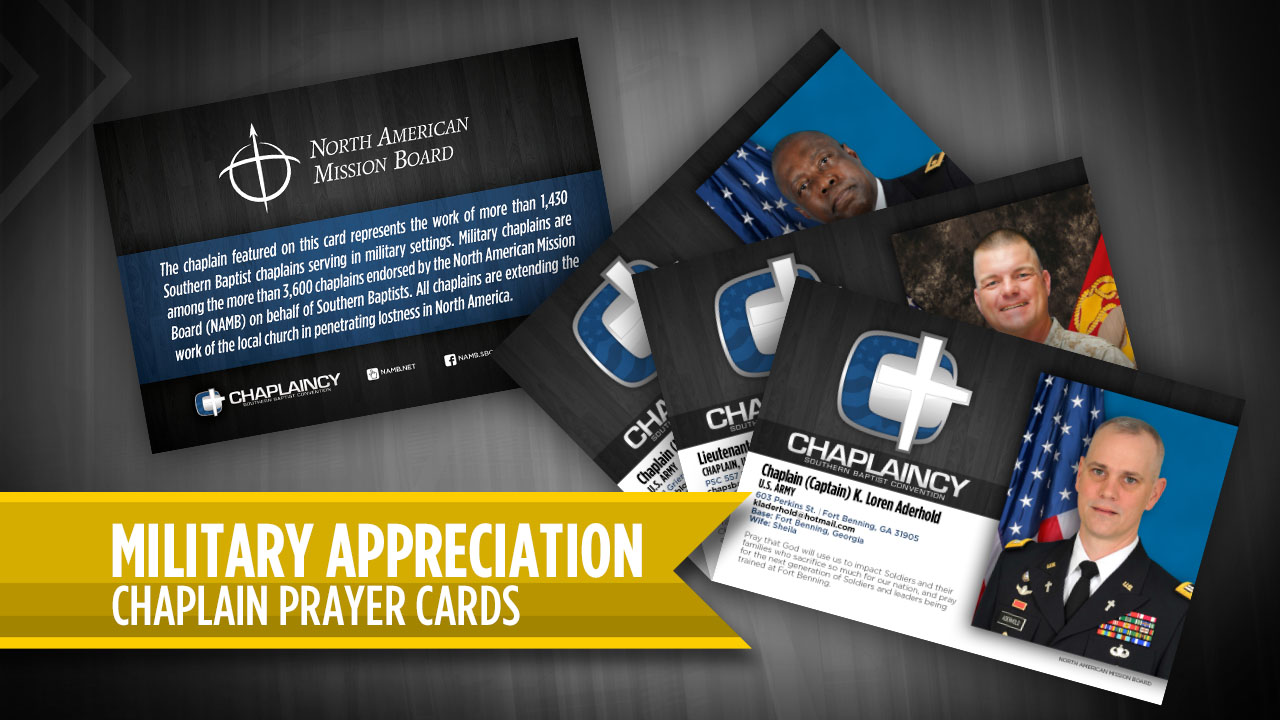
APLHARETTA, Ga. (BP) — As thousands of troops continue coming home from Afghanistan, July 4 can provide a special opportunity for churches to honor veterans and their families for their service during the nation’s 12-year combat deployment in the wake of 9/11.
That opportunity, notes chaplain Doug Carver, a retired major general and executive director for chaplaincy services for the North American Mission Board, can be especially meaningful for a unique segment of the military.
“The unsung heroes among all of those returning from combat environments,” he said, “are chaplains, including our pastors in uniform, endorsed by the Southern Baptist Convention.”
Carver, who served as U.S. Army chief of chaplains before his retirement, recommends that churches include in their Independence Day observances not just patriotic hymns but also a testimony from a chaplain or veteran — not only to encourage those who have served their country but also to show Southern Baptists the vital impact chaplaincy has on the lives of others.
“Chaplains have braved dangerous assignments with grace and strength. They have cared for the wounded and dying, and honored our fallen,” Carver said. “And all of them are representatives of our churches. Chaplains go to places most church members cannot go. They go where the Gospel is difficult to deliver in places that are underserved or not served at all.”
Marine Major Keith Warren experienced that impact firsthand while serving in Iraq. When a chaplain asked to speak with him in December 2005, he assumed there was bad news for someone under his command.
“I expected him to tell me that one of my Marines had a family emergency,” Warren recounted. “To my surprise, it was me who had the family emergency.”
His deployment left his new wife alone to deliver their first son, who died during birth in December 2005.
“I immediately began to blame myself for not being there to prevent the incident from happening,” said Warren, presently in Afghanistan with the 2nd Marine Aircraft Wing. “[The chaplain] listened patiently as I beat myself up for doing my job, deploying and leaving my newlywed wife to give birth to our child alone. He calmly talked to me about how the situation was beyond my, my wife’s and family’s control.
“He said a prayer for my wife, our son and me. He provided a list of contacts and resources to help us heal from our loss.”
Warren’s story shows the importance of testimonies, Carver said.
“Ask veterans to give a testimony, both of how Christ provided for their needs when they served and their faithfulness to Christ during their military service,” he suggested. “This may also include the service provided to them by chaplains. It would be appropriate to honor the families of, and the memories of, those who lost their lives in service to our country.”
Prayer is another key avenue of support, Carver said. For military chaplains in particular, NAMB has produced a set of 50 prayer cards to assist Southern Baptists in praying for their ministry among the troops. Each Southern Baptist church has received a set of these cards along with details for obtaining additional sets. Churches also can download military ministry videos at www.namb.net/chaplaincy and access suggestions for a commemorative service.
In addition, NAMB has produced resources to help churches commission members as chaplains or missionaries, offering everything a church needs to conduct a commissioning service. Information about the commissioning guide is also available at www.namb.net/chaplaincy.
“The personal connection and contact that churches provide for chaplains is so important in helping meet their own personal needs and assisting their military families, particularly in the chaplain’s absence,” Carver said. “Southern Baptist churches are a critical lifeline for our chaplains who are called and sent out by their local church to carry the Gospel of Jesus Christ to members of the armed services. Chaplains minister to our troops as an extension of the church’s ministry to the military.”
Churches also can give chaplains an opportunity to share their stories from the longest armed conflict deployments in U.S. history, Carver said. “That time of sharing is not only an encouragement to the chaplains, it is also an encouragement to the church recognizing their support and can be an encouragement to people hearing the chaplains’ testimonies. You may have a future chaplain challenged by a chaplain’s story.”
Honoring veterans is especially meaningful this year, Carver said, as the U.S. marks 40 years since the end of the Vietnam War.
President Barack Obama has proclaimed May 28, 2012, through November 11, 2025, as a 13-year commemoration of the 50th anniversary of Vietnam. The president is calling on all Americans to honor Vietnam veterans, from those who were killed, wounded or unaccounted for to former prisoners of war and their families.
This year marks the 238th anniversary of chaplaincy in the U.S. military, having begun in 1775.
“This is a nation that has been under God for more than 200 years,” Carver said. “Chaplains are a part of that. Southern Baptists have a heritage of patriotic service. … As chaplains minister to all of these servants and their family members, they bring the presence of Christ and have the opportunity to share hope and the Gospel in an incredible array of environments.”
–30–
Joe Conway writes for the North American Mission Board. Portions of this article are published in the Summer 2013 edition of On Mission magazine at www.onmission.com. Get Baptist Press headlines and breaking news on Twitter (@BaptistPress), Facebook (Facebook.com/BaptistPress) and in your email (baptistpress.com/SubscribeBP.asp).

















